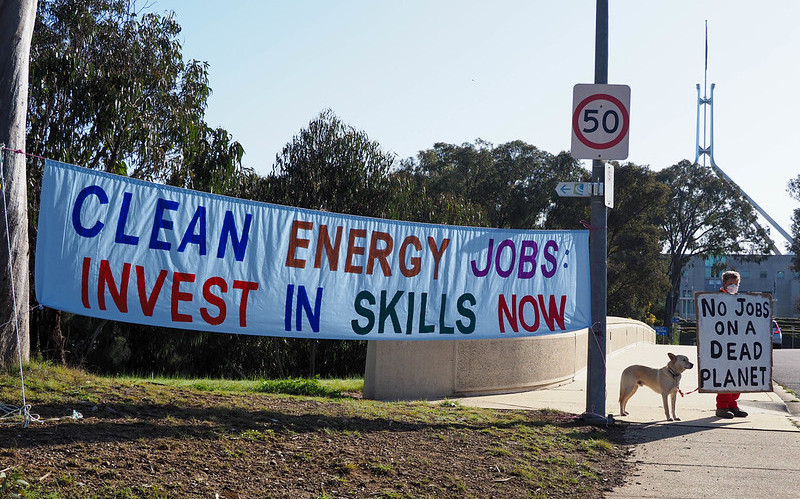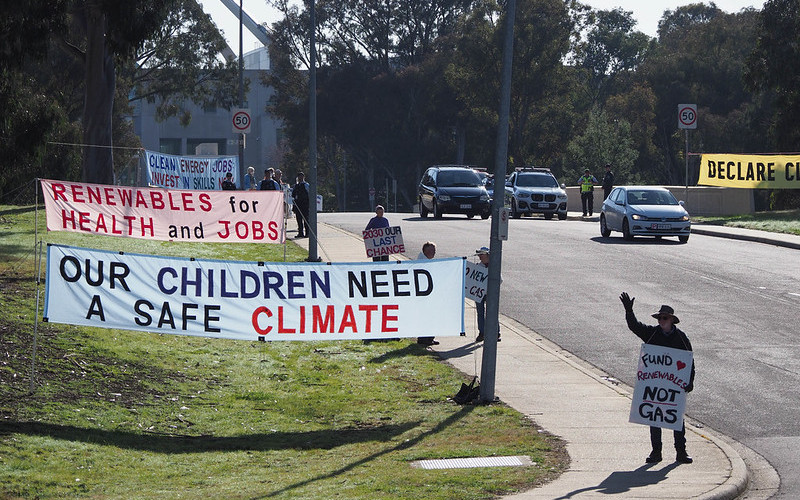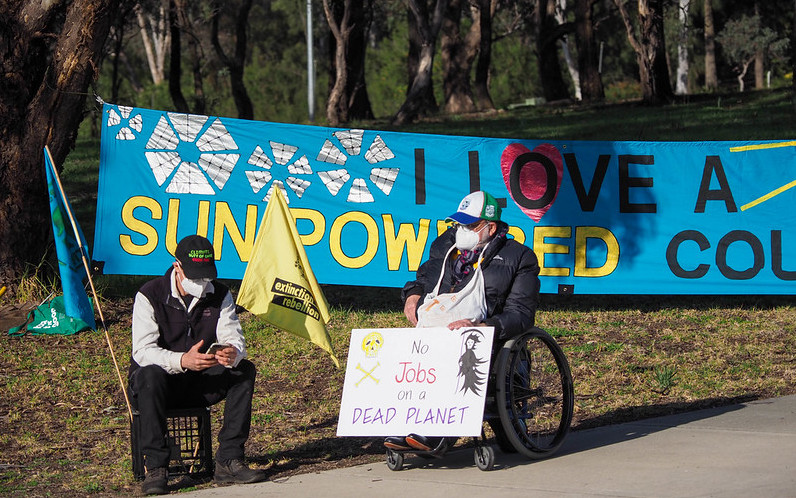
Australian jobs and much else at risk in an era of accelerating catastrophes
Extinction Rebellion Australia, 4 Sept 2022
ACT rebels flag the need for urgent climate action in a protest during the September Jobs and Skills Summit at Parliament House
In the keynote address to the national jobs and skills summit, Kane Thornton, Clean Energy Council chief executive, said: “The clean energy sector has been a political football, kicked about as part of the climate wars and a wasted decade.”
In Kane's view, nothing undermined confidence of investors more than unpredictable, unhelpful and unstable climate and energy policy.
“Redressing this”, she said “requires collaboration between governments at all levels, community, development bodies, unions, the education sector and the clean energy industry. We don’t have time to waste.”

The consequences of inaction are clear. Climate change will seriously impact employment across economic sectors and regions. These impacts will result from extreme weather events such as droughts, heat waves, heavy precipitation, and increased occurrence and intensity of cyclones, or from more gradual climatic processes such as sea level rise, rising temperatures and changing rainfall patterns.
—International Labour Organisation website FAQ on climate change and jobs
It’s not just jobs that are at risk.
"What we are currently living through is a kind of major tipping point or a great upheaval … we are living the end of what could have seemed an era of abundance … the end of the abundance of products of technologies that seemed always available … the end of the abundance of land and materials including water."
This warning came in a recent speech, not by a climate activist, but by French President Emanuel Macron. Macron joins a small but growing list of leaders who are beginning to take on the scale of the catastrophes confronting us.

In 1990, scientists from around the world contributed to the first of the Intergovernmental Panel on Climate Change (IPCC) reports. The sixth series of reports is coming out this year. The IPCCC reports were intended to act as a climate beacon, but scientists fear that those reports and many other warnings have not been enough to trigger government and industry action at anything like the urgency required.
The tragedy of climate change science is that compelling evidence is gathered, fresh warnings issued, new institutions established and novel methodologies developed to redress the problems. Yet, greenhouse gas emissions and other indicators of adverse climate change, and global change more broadly, rise year upon year…
—From 'The Tragedy of Climate Change Science', a paper in the journal Climate and Development by Australian and New Zealand-based scientists Tim Smith, Iain White, and Bruce Glavovic.
Professor Glavovic says that under the world's gaze, the rule of law is helping prop up the very industries that are causing climate change.
He argues that carrying on with IPCC reporting in its present form helps to hold up a façade — creating the illusion things are being done, while polluting and extractive industries carry on, more or less with business as usual.
"Our institutional architecture is organised around short-term profit that privileges the wealthy and the powerful at the expense of the Global South and the majority of the world's population," he says.
"So how do you change that?"
Prosperous members of communities, particularly in the West, have taken the ready availability of jobs, services and consumer products for granted. But this was built on exploitation of the planet, each other, nature and creation —and it could never last.
The task now is to convey the urgency of the task ahead of us. A ‘business as usual’ approach to employment and every other climate and environment-related issue is a recipe for death and destruction.
If we are to succeed, we need many more people to join rebels in the ACT and everywhere else, in effective action and nonviolent civil disobedience.